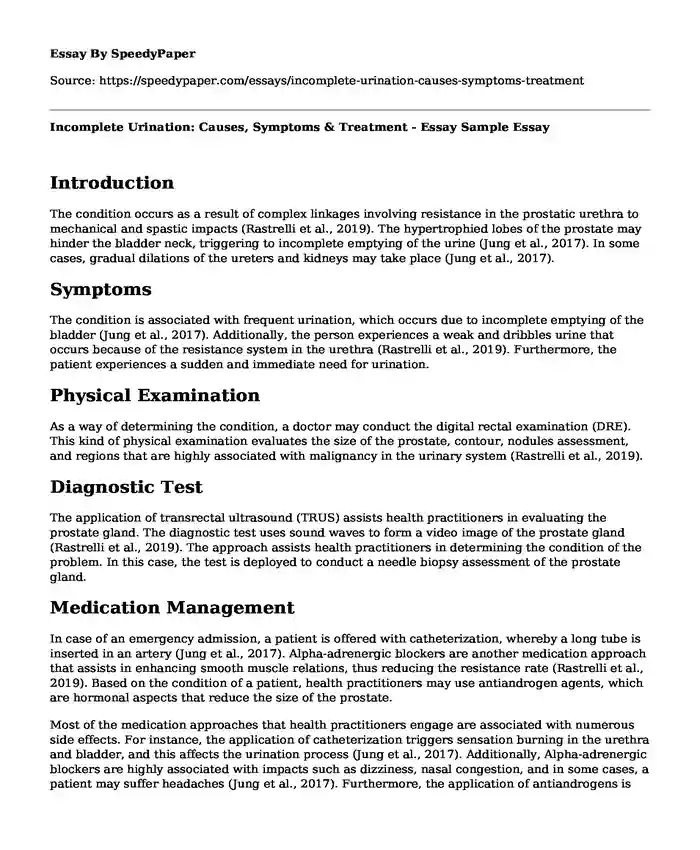
| Type of paper: | Essay |
| Categories: | Health and Social Care Medicine Healthcare |
| Pages: | 3 |
| Wordcount: | 796 words |
Introduction
The condition occurs as a result of complex linkages involving resistance in the prostatic urethra to mechanical and spastic impacts (Rastrelli et al., 2019). The hypertrophied lobes of the prostate may hinder the bladder neck, triggering to incomplete emptying of the urine (Jung et al., 2017). In some cases, gradual dilations of the ureters and kidneys may take place (Jung et al., 2017).
Symptoms
The condition is associated with frequent urination, which occurs due to incomplete emptying of the bladder (Jung et al., 2017). Additionally, the person experiences a weak and dribbles urine that occurs because of the resistance system in the urethra (Rastrelli et al., 2019). Furthermore, the patient experiences a sudden and immediate need for urination.
Physical Examination
As a way of determining the condition, a doctor may conduct the digital rectal examination (DRE). This kind of physical examination evaluates the size of the prostate, contour, nodules assessment, and regions that are highly associated with malignancy in the urinary system (Rastrelli et al., 2019).
Diagnostic Test
The application of transrectal ultrasound (TRUS) assists health practitioners in evaluating the prostate gland. The diagnostic test uses sound waves to form a video image of the prostate gland (Rastrelli et al., 2019). The approach assists health practitioners in determining the condition of the problem. In this case, the test is deployed to conduct a needle biopsy assessment of the prostate gland.
Medication Management
In case of an emergency admission, a patient is offered with catheterization, whereby a long tube is inserted in an artery (Jung et al., 2017). Alpha-adrenergic blockers are another medication approach that assists in enhancing smooth muscle relations, thus reducing the resistance rate (Rastrelli et al., 2019). Based on the condition of a patient, health practitioners may use antiandrogen agents, which are hormonal aspects that reduce the size of the prostate.
Most of the medication approaches that health practitioners engage are associated with numerous side effects. For instance, the application of catheterization triggers sensation burning in the urethra and bladder, and this affects the urination process (Jung et al., 2017). Additionally, Alpha-adrenergic blockers are highly associated with impacts such as dizziness, nasal congestion, and in some cases, a patient may suffer headaches (Jung et al., 2017). Furthermore, the application of antiandrogens is highly linked with sexual dysfunctions, infertility, and depression (Rastrelli et al., 2019).
During the catheterization, nurses are mandated to prepare the equipment that is needed during the process (Jung et al., 2017). Additionally, they are supposed to prepare patients fully for the process as they wait for the doctor to conduct catheterization (Rastrelli et al., 2019). Moreover, nurses are mandated to administer alpha-adrenergic blockers and antiandrogens to a patient in accordance with the instructions.
Surgical Procedure of TURP
The process involves cutting away the part of the prostate that has been affected. In this case, a resectoscope is inserted through the tip of a penis (Jung et al., 2017). The instrument assists health practitioner to view and cut away excess prostate tissues, which affect the movement of urine (Rastrelli et al., 2019).
Continuous Bladder Irrigation (CBI)
After conducting the surgery, CBI is used as a supplementary approach to control the adverse events of the condition. In this case, CBI ensures there is a good flow of urine, thus preventing the growth of prostate tissue that blocks the urethra (Rastrelli et al., 2019). After the surgery, patients need quality care services to avoid other health issues (Jung et al., 2017). As a way of enhancing care services, nurses are required to offer patients with a lot of drink water, which helps in flushing out the bladder (Rastrelli et al., 2019). Additionally, nurses are required to eat food products with a high level of fiber, which assists in preventing constipation. In some cases, a doctor may recommend the application of a stool softener (Jung et al., 2017). The application of pelvic floor exercises and change of fluid application in the food are crucial approach in the control of pain bladder spams that occur due to CBI.
Discharge Instructions
When discharging the patient, it is crucial for a health practitioner to provide written and oral instructions on how to examine the urinary output and approaches he is supposed to conduct to avoid complications (Rastrelli et al., 2019). Furthermore, the nurse should teach the patient how to regain urinary control system (Jung et al., 2017). Avoiding particular food could regulate bladder discomfort and drinking water to increase the level of fluid.
References
Jung, J. H., Kim, J., MacDonald, R., Reddy, B., Kim, M. H., & Dahm, P. (2017). Silodosin for the treatment of lower urinary tract symptoms in men with benign prostatic hyperplasia. Cochrane Database of Systematic Reviews, (11). https://www.cochranelibrary.com/cdsr/doi/10.1002/14651858.CD012615.pub2/full
Rastrelli, G., Vignozzi, L., Corona, G., & Maggi, M. (2019). Testosterone and benign prostatic hyperplasia. Sexual Medicine Reviews, 7(2), 259-271. https://www.smr.jsexmed.org/article/S2050-0521(18)30143-4/fulltext
Cite this page
Incomplete Urination: Causes, Symptoms & Treatment - Essay Sample. (2023, Oct 27). Retrieved from https://speedypaper.net/essays/incomplete-urination-causes-symptoms-treatment
Request Removal
If you are the original author of this essay and no longer wish to have it published on the SpeedyPaper website, please click below to request its removal:
- Free Essay Example on Placenta Previa
- Free Essay Example on Post-Traumatic Disorder
- Free Essay Sample on Diagnostic Medical Sonography
- CNO's Leadership Plan for Establishing a Covid-19 Unit in Mid-Sized TN Hospital - Essay Sample
- Health Care Reform: The Affordable Care Act and Beyond - Essay Sample
- Demographic Table - Essay Sample
- Why is Alzheimer's the Most Dangerous Factor Leading to Memory Impairment - Essay Sample
Popular categories




